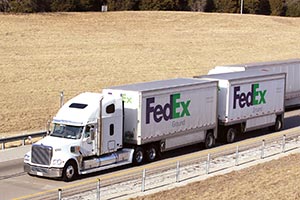Judge Rules for 2 Large Fleets in Cases Involving Contractors

This story appears in the Feb. 16 print edition of Transport Topics.
Two of the nation’s largest trucking companies won legal victories in Massachusetts when a U.S. District Court judge overturned two of his earlier decisions on independent contractor cases so they would line up with an appeals court decision.
Judge Richard Stearns issued orders Feb. 5 in favor of FedEx Ground and J.B. Hunt Transport, which had been sued by owner-operators working for the motor carriers. The drivers claimed they were misclassified as independent contractors and should have been considered employees.
Stearns said he issued the orders to mesh with an October decision by the 1st U.S. Circuit Court of Appeals in Boston in the case Massachusetts Delivery Association vs. Martha Coakley.
“In MDA, a case virtually identical to this one in its relevant respects, the First Circuit rejected the view I shared with Judge [Denise] Casper that the Federal Aviation Administration Authorization Act did not preempt the second prong” of a Massachusetts state law, Stearns wrote in his FedEx order.
Casper, also a U.S. District Court judge in Boston, heard the Massachusetts Delivery case at trial, whereas FedEx and Hunt were on Stearns’ docket.
FAAAA is important for trucking because of a section that says states may not regulate the industry based on pricing, routes or services. Congress reserved that authority for itself because most trucking is interstate commerce, said Richard Pianka, deputy chief counsel of American Trucking Associations.
“Congress wanted motor carriers to operate on a basis of national rules,” said Pianka, adding that Congress passed FAAAA in 1994, in part, to correct problems associated with deregulating trucking in 1980.
FedEx Ground and J.B. Hunt Transport are subsidiaries of FedEx Corp. and J.B. Hunt Transport Services, which rank Nos. 2 and 3, respectively, on the Transport Topics Top 100 list of the largest for-hire carriers in the United States and Canada.
Massachusetts addresses labor classification with a three-part test, Stearns said. It is the second piece of the test that has caused major problems for trucking companies using the independent contractor model.
The second part says a truly independent contractor must provide a service that is “performed outside the usual course of the business of the employer.”
The other two prongs say a proper independent contractor should be “free from control and direction” in the performance of the service and that he or she should be “independently established” in a relevant “trade, occupation, profession or business.”
ATA’s Pianka said Massachusetts courts have decided that for trucking, what an owner-operator does is not outside the usual course of what a motor carrier does.
That has the effect of “turning the test into a ban,” he said of prong two.
Attorneys for the drivers said they are pursuing appeals.
“The case is being appealed [Feb. 11],” said Harold Lichten, the Boston-based attorney representing 10 drivers who sued FedEx. “The decision is an outlier and very unlikely to stand up on appeal.”
“We are planning to file a motion for reconsideration with Judge Stearns,” said Hillary Schwab, also a Boston lawyer, who represents William Remington and Musan Durakovic, the drivers who sued Hunt. “I expect that we will be filing that motion within the next week or so.”
The 1st U.S. Circuit also covers Maine, New Hampshire, Rhode Island, and Puerto Rico. The Massachusetts Delivery decision said trial courts must not uphold state regulation of price, routes and services unless there is a very compelling reason to do so.
FAAAA’s provision for price, routes and services is also a key part of the argument by Penske Logistics to overturn a California law that mandates rest breaks. Penske and American Trucking Associations have asked the U.S. Supreme Court to hear Penske’s appeal regarding the law.




